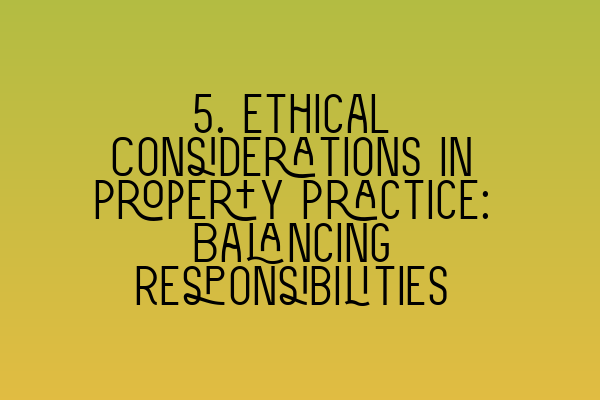**5. Ethical Considerations in Property Practice: Balancing Responsibilities**
When it comes to property practice, solicitors have a myriad of responsibilities to juggle. From ensuring legal compliance to acting in the best interests of their clients, there are several ethical considerations that must be carefully balanced. In this blog post, we will explore five key ethical considerations in property practice and discuss the importance of balancing these responsibilities.
1. **Conflicts of Interest**: One of the most critical ethical considerations in property practice is avoiding conflicts of interest. Solicitors must be diligent in identifying and managing any conflicts that may arise between clients or between their own interests and those of their clients. This requires open communication, thorough conflict checks, and the establishment of appropriate boundaries. Failing to address conflicts of interest can lead to legal consequences and damage the solicitor’s professional reputation.
2. **Duty of Confidentiality**: Another important ethical consideration is maintaining client confidentiality. Solicitors have a duty to protect the confidential information shared by their clients, both during the course of their representation and even after it has ended. This means taking measures to safeguard sensitive information, such as ensuring secure document storage and limiting access to confidential files. Breaching client confidentiality can have serious legal and professional ramifications.
3. **Professional Competence and Skill**: Solicitors have an ethical obligation to provide competent and skilled legal services to their clients. This requires staying informed about current developments in property law, attending relevant training and education courses, and maintaining a high level of expertise. By continually honing their skills, solicitors can ensure that they are providing the best possible advice and representation to their clients.
4. **Transparency and Honesty**: Honesty and transparency are fundamental ethical principles in property practice. Solicitors must provide their clients with accurate and comprehensive information about their cases, including potential risks and costs. By being transparent, solicitors can build client trust, foster effective communication, and ensure that their clients can make informed decisions. Misleading or withholding information goes against professional standards and can have serious consequences for the solicitor and their clients.
5. **Avoiding Financial Impropriety**: Finally, solicitors must also be mindful of their financial responsibilities. This includes handling client funds with care, adhering to relevant regulations and guidelines, and avoiding any actions that could be perceived as financial impropriety. By maintaining strict financial controls and conducting regular audits, solicitors can demonstrate their commitment to ethical financial practices.
In conclusion, property practice is a complex field that requires solicitors to balance a multitude of ethical responsibilities. By carefully managing conflicts of interest, maintaining client confidentiality, continuously improving their professional competence, practicing transparency and honesty, and avoiding financial impropriety, solicitors can uphold their ethical obligations and provide the highest level of service to their clients.
If you are preparing for the SQE (Solicitors Qualifying Examination) and want to test your knowledge and skills, check out these SQE 1 Practice Exam Questions and SQE 1 Practice Mocks FLK1 FLK2. And if you need assistance with your SQE 2 preparation or SQE 1 preparation, explore the comprehensive SQE 2 Preparation Courses and SQE 1 Preparation Courses available. Stay updated on important dates and deadlines by visiting the SRA SQE Exam Dates page.
Remember, being well-versed in the ethical considerations of property practice is essential for your professional success and the trust your clients place in you as their solicitor.
